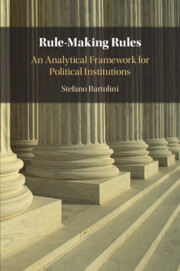Refine search
Actions for selected content:
7 results
6 - Roman Roots
- from Part II - The History of the Constitution
-
- Book:
- The Story of Constitutions
- Published online:
- 19 October 2023
- Print publication:
- 02 November 2023, pp 98-103
-
- Chapter
- Export citation
5 - Meso-institutions
- from Part II - On Political Institutions
-
- Book:
- Rule-Making Rules
- Published online:
- 16 June 2022
- Print publication:
- 30 June 2022, pp 154-202
-
- Chapter
- Export citation

Rule-Making Rules
- An Analytical Framework for Political Institutions
-
- Published online:
- 16 June 2022
- Print publication:
- 30 June 2022
4 - Calvin, Tradition, and Vernacular Works
-
- Book:
- Calvin and the Christian Tradition
- Published online:
- 26 May 2022
- Print publication:
- 09 June 2022, pp 123-142
-
- Chapter
- Export citation
12 - Rights (II)
- from Part II - Concepts
-
-
- Book:
- The Cambridge Companion to Hugo Grotius
- Published online:
- 03 September 2021
- Print publication:
- 16 September 2021, pp 259-274
-
- Chapter
- Export citation
11 - Rights (I)
- from Part II - Concepts
-
-
- Book:
- The Cambridge Companion to Hugo Grotius
- Published online:
- 03 September 2021
- Print publication:
- 16 September 2021, pp 243-258
-
- Chapter
- Export citation
4 - George Harris and the Comparative Legal Background of the First English Translation of Justinian’s Institutes
-
-
- Book:
- Common Law, Civil Law, and Colonial Law
- Published online:
- 01 April 2021
- Print publication:
- 15 April 2021, pp 120-139
-
- Chapter
-
- You have access
- Open access
- HTML
- Export citation
